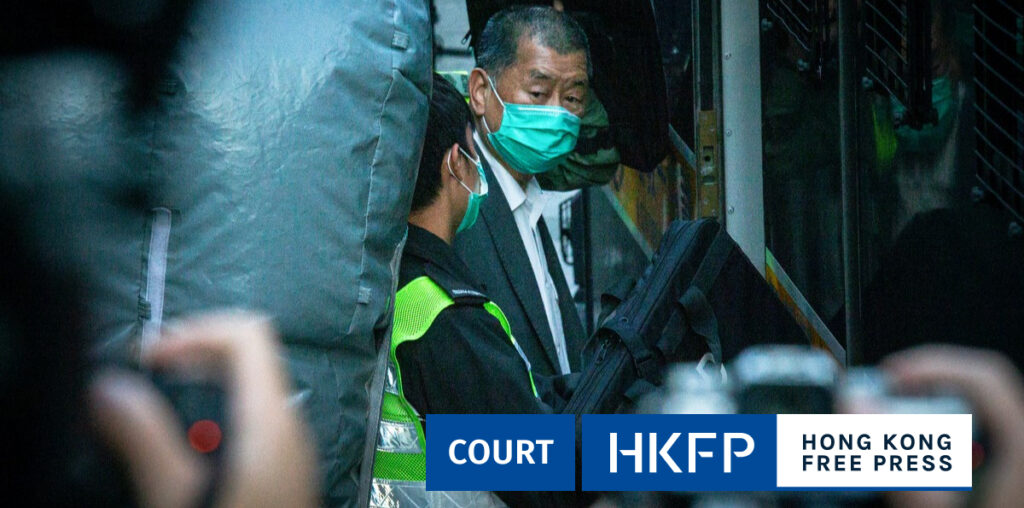Jailed media tycoon Jimmy Lai has denied that he instructed staff of his now-shuttered Apple Daily newspaper to urge the West to impose sanctions on Hong Kong, his national security trial has heard.

The 76-year-old tycoon continued to give evidence on Monday in front of handpicked judges. He faces two counts of conspiracy to collude with foreign forces under the Beijing-imposed national security law. He could be jailed for life if convicted.
He is also charged with one count of conspiracy to publish “seditious” materials under a colonial-era legislation.
Several of his former senior staffers, including ex-Next Digital CEO Cheung Kim-hung and ex-editorial writer Yeung Ching-kee, opted to testify for the prosecution in exchange for more lenient sentences.
Cheung earlier told the court that Lai had hoped foreign countries would take “hostile actions on China, including sanctions.”
Asked by his lawyer Steven Kwan on Monday if he ever said that to Cheung, Lai denied it, adding that he would not have “specified sanctions or hostility.”
“There’s no reason for me to talk to him like this … hostility is a word I seldom use, I don’t remember that I have ever used it,” he said.


Lai also maintained that he only told Cheung about featuring more negative news in an English edition of Apple Daily, which was launched in May 2020, about a month before the enactment of the Beijing-imposed security law.
“I never said anything about sanctions … [Cheung] made it up,” he said.
Kwan also asked Lai to elaborate on Yeung’s earlier evidence, in which the former-editorial writer claimed Lai wanted the new English Apple Daily to prompt the US government to adopt a “stronger stance” against China.
“I didn’t think about anything in particular,” Lai said. “Because, you know, the [US] government, they know what they would do. That’s not my portion to think anything particular for them.”
‘Truth means credibility’
Monday marks the 96th day of the tycoon’s high-profile national security trial and the fourth day he sat in the witness box.
The court earlier heard that Lai wanted to disrupt the monopoly of the South China Morning Post in Hong Kong’s English news landscape, and that he wanted the English edition of Apple Daily to focus on “negative news” about China.
Lai told the court on Monday that he also wanted the English version to harness support from the international community: “Because if readers read us, they would [speak up] for us. Their voices would become a protection through the politicians who attended to their voices,” he said, adding that international support was the “salvation” of the democracy movement in Hong Kong.
Asked about his instruction to Apple Daily staff to get then US-vice president Mike Pence to subscribe to the newspaper, Lai said Pence’s prestige could generate “a lot of attention” in favour of Apple Daily, but added that it was “almost impossible.”
The court heard that Lai wrote in a WhatsApp group with Apple Daily staff that he aspired for the English edition to be “the most reliable and popular platform” with information about the Chinese Communist Party in the world.
Asked if such aspirations were inconsistent with his earlier message that he did not intend to provide balanced reporting in the English edition, Lai said: “Balanced view doesn’t mean credibility, truth means credibility.”


Lai also told the court that Simon Lee, a former Apple Daily columnist whom Lai described as his “mentee,” was handling his personal Twitter account because he did not know how to follow accounts or retweet. Twitter has since been rebranded as X.
Simon Lee had decided who Lai followed, including then-US president Donald Trump, edit the tweets that Lai wrote himself, and also added hashtags to the posts, the tycoon said.
Lai denied opening his Twitter account in May 2020 to “increase his own influence.”
“It will be hundreds of thousands of people following, and I think it’s easy to let them know what happens in Hong Kong,” Lai said. “I did not think about my own influence. I am not so presumptuous as a person.”
Separately, Kwan on Monday began to go through Apple Daily’s messaging records on workplace communication application Slack regarding 25 “lunchbox” meetings Lai had with senior staffers since October 2018.
Lai earlier said those meetings were intended for business development, but his staff member-turned-prosecution witnesses said Lai gave editorial direction to senior members of the newspaper during such occasions.
Kwan said the court would not find evidence of Lai giving editorial direction in the records but admitted the process could be “very tedious.”
A panel of three designated national security judges presiding over the trial asked both parties to find a way to shorten the process of examining Slack records, before they adjourned proceedings to Wednesday.
Beijing inserted national security legislation directly into Hong Kong’s mini-constitution in June 2020 following a year of pro-democracy protests and unrest. It criminalised subversion, secession, collusion with foreign forces and terrorist acts – broadly defined to include disruption to transport and other infrastructure. The move gave police sweeping new powers and led to hundreds of arrests amid new legal precedents, while dozens of civil society groups disappeared. The authorities say it restored stability and peace to the city, rejecting criticism from trade partners, the UN and NGOs.
Support HKFP | Policies & Ethics | Error/typo? | Contact Us | Newsletter | Transparency & Annual Report | Apps
Help safeguard press freedom & keep HKFP free for all readers by supporting our team


Source link

